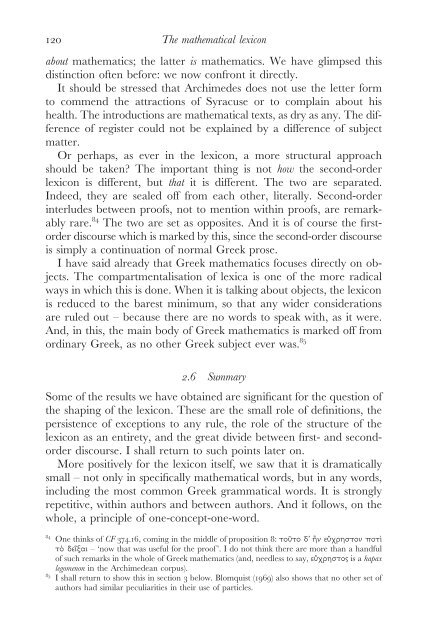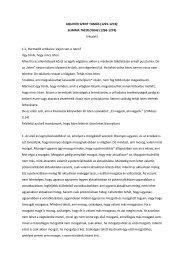- Page 2 and 3:
The aim of this book is to explain
- Page 4 and 5:
ideas in context 51 THE SHAPING OF
- Page 6 and 7:
THE SHAPING OF DEDUCTION IN GREEK M
- Page 8 and 9:
To Maya
- Page 10 and 11:
Contents Preface page xi List of ab
- Page 12 and 13:
Preface This book was conceived in
- Page 14 and 15:
Abbreviations greek authors Abbrevi
- Page 16 and 17:
documentary sources Abbreviation St
- Page 18 and 19:
Note on the figures As is explained
- Page 20 and 21:
Introduction This book can be read
- Page 22 and 23:
Introduction 3 production of ‘nor
- Page 24 and 25:
Introduction 5 clarify what these m
- Page 26 and 27:
Introduction 7 is because they are,
- Page 28 and 29:
A specimen of Greek mathematics Rea
- Page 30 and 31:
A specimen of Greek mathematics 11
- Page 32 and 33:
The material implementation of diag
- Page 34 and 35:
The material implementation of diag
- Page 36 and 37:
The material implementation of diag
- Page 38 and 39:
Practices of the lettered diagram 1
- Page 40 and 41:
Practices of the lettered diagram 2
- Page 42 and 43:
Practices of the lettered diagram 2
- Page 44 and 45:
Practices of the lettered diagram 2
- Page 46 and 47:
Practices of the lettered diagram 2
- Page 48 and 49:
Practices of the lettered diagram 2
- Page 50 and 51:
Α Τ Ο Ν Υ Η Ξ Ε Practices o
- Page 52 and 53:
Practices of the lettered diagram 3
- Page 54 and 55:
Practices of the lettered diagram 3
- Page 56 and 57:
Practices of the lettered diagram 3
- Page 58 and 59:
Practices of the lettered diagram 3
- Page 60 and 61:
Τ Π Ζ φ Practices of the letter
- Page 62 and 63:
obstructs the development of other,
- Page 64 and 65:
Γ Μ Α Ρ Κ Β Μ Α Κ Ρ ∆ P
- Page 66 and 67:
Practices of the lettered diagram 4
- Page 68 and 69:
Practices of the lettered diagram 4
- Page 70 and 71:
Practices of the lettered diagram 5
- Page 72 and 73:
Practices of the lettered diagram 5
- Page 74 and 75:
Ε Β Ν Λ Η Practices of the let
- Page 76 and 77:
Practices of the lettered diagram 5
- Page 78 and 79:
Contexts for the emergence of the l
- Page 80 and 81:
Contexts for the emergence of the l
- Page 82 and 83:
Contexts for the emergence of the l
- Page 84 and 85:
Contexts for the emergence of the l
- Page 86 and 87:
Summary 67 4 summary Much of the ar
- Page 88 and 89: The origins of the practices 69 Α
- Page 90 and 91: I follow two practices: The origins
- Page 92 and 93: Γ ∆ Ε Β The origins of the pra
- Page 94 and 95: The origins of the practices 75 AB
- Page 96 and 97: The origins of the practices 77 Man
- Page 98 and 99: The implications of the practices 7
- Page 100 and 101: Λ The implications of the practice
- Page 102 and 103: The implications of the practices 8
- Page 104 and 105: The implications of the practices 8
- Page 106 and 107: The implications of the practices 8
- Page 108 and 109: chapter 3 The mathematical lexicon
- Page 110 and 111: Definitions 91 Archimedes and Apoll
- Page 112 and 113: Definitions 93 when a certain prope
- Page 114 and 115: Definitions 95 and no definition of
- Page 116 and 117: Definitions 97 A second issue is th
- Page 118 and 119: Definitions 99 Figure 3.1. Two segm
- Page 120 and 121: Definitions 101 definiens of the co
- Page 122 and 123: The shape of the lexicon 103 ently
- Page 124 and 125: The shape of the lexicon 105 Why do
- Page 126 and 127: The shape of the lexicon 107 Elemen
- Page 128 and 129: The shape of the lexicon 109 At lea
- Page 130 and 131: The shape of the lexicon 111 rectil
- Page 132 and 133: The shape of the lexicon 113 To con
- Page 134 and 135: The shape of the lexicon 115 releva
- Page 136 and 137: The shape of the lexicon 117 Howeve
- Page 140 and 141: Comparative remarks 121 We saw how
- Page 142 and 143: The shaping of the lexicon 123 not
- Page 144 and 145: The shaping of the lexicon 125 regu
- Page 146 and 147: chapter 4 Formulae introduction and
- Page 148 and 149: The Homeric case 129 tools in Homer
- Page 150 and 151: The Homeric case 131 It is markedly
- Page 152 and 153: Greek mathematical formulae 133 2 g
- Page 154 and 155: Greek mathematical formulae 135 Thi
- Page 156 and 157: Greek mathematical formulae 137 23.
- Page 158 and 159: Elements ii contains 12 second-orde
- Page 160 and 161: Greek mathematical formulae 141 We
- Page 162 and 163: This formula signifies a relation b
- Page 164 and 165: Greek mathematical formulae 145 for
- Page 166 and 167: protasis P 73 S 50 C33 P78 ekthesis
- Page 168 and 169: The behaviour of formulae 149 rence
- Page 170 and 171: Formula 31a is a constituent in the
- Page 172 and 173: The behaviour of formulae 153 the s
- Page 174 and 175: The behaviour of formulae 155 certa
- Page 176 and 177: The behaviour of formulae 157 And,
- Page 178 and 179: The behaviour of formulae 159 formu
- Page 180 and 181: The behaviour of formulae 161 total
- Page 182 and 183: one’s text. This expectation may
- Page 184 and 185: Summary: back to the Homeric case 1
- Page 186 and 187: Summary: back to the Homeric case 1
- Page 188 and 189:
Starting-points 169 3 1 2 Figure 5.
- Page 190 and 191:
Starting-points 171 Deduction, in f
- Page 192 and 193:
Ζ Η Α Starting-points 173 Ξ Μ
- Page 194 and 195:
Starting-points 175 This clause is
- Page 196 and 197:
Α (c) Implicit arguments (d) Hypot
- Page 198 and 199:
�στι τ�ς ΓΕ β � ∆Ε
- Page 200 and 201:
Starting-points 181 Clearly, there
- Page 202 and 203:
Starting-points 183 This relies upo
- Page 204 and 205:
eductio argument. The refutation of
- Page 206 and 207:
Β Ε Η Ζ Α ∆ Arguments 187 Fi
- Page 208 and 209:
Arguments 189 are unworried about i
- Page 210 and 211:
Arguments 191 line of reasoning is
- Page 212 and 213:
Α Ζ Ν Η Μ Arguments 193 Β ∆
- Page 214 and 215:
O 2 ΕΓ 3 1 2 Arguments 195 6 4 5
- Page 216 and 217:
Arguments 197 On a wider view still
- Page 218 and 219:
all arguments are two-assertion arg
- Page 220 and 221:
The structure of proofs 201 The 10-
- Page 222 and 223:
1 3 2 The structure of proofs 203 6
- Page 224 and 225:
The structure of proofs 205 3.2.3 N
- Page 226 and 227:
The structure of proofs 207 smooth,
- Page 228 and 229:
The structure of proofs 209 Here is
- Page 230 and 231:
The structure of proofs 211 2 4 1 3
- Page 232 and 233:
The structure of proofs 213 The pro
- Page 234 and 235:
The structure of proofs 215 as in t
- Page 236 and 237:
The tool-box 217 Elements i. Def. 1
- Page 238 and 239:
The tool-box 219 Elements i.8, for
- Page 240 and 241:
The tool-box 221 ‘remembered’ (
- Page 242 and 243:
The tool-box 223 Proposition 5 argu
- Page 244 and 245:
Elements I Congruence 15 20 4 8 26
- Page 246 and 247:
I have not attempted a complete ana
- Page 248 and 249:
The tool-box 229 4.4 Accessing the
- Page 250 and 251:
The tool-box 231 that the Greek geo
- Page 252 and 253:
The tool-box 233 results, I claimed
- Page 254 and 255:
Summary 235 Greek mathematics, what
- Page 256 and 257:
Summary 237 and Sedley invite Arist
- Page 258 and 259:
Summary 239 to Conics i; this is hi
- Page 260 and 261:
Introduction and plan of the chapte
- Page 262 and 263:
Α ∆ Hints for a solution 243 Ε
- Page 264 and 265:
Hints for a solution 245 centre, as
- Page 266 and 267:
‘If two circles cut each other, t
- Page 268 and 269:
Hints for a solution 249 constructi
- Page 270 and 271:
Hints for a solution 251 ‘Active
- Page 272 and 273:
Mueller must be right in viewing th
- Page 274 and 275:
The Greek solution 255 (‘protasis
- Page 276 and 277:
C(x) P(x) C(a) I Say P(a) The Greek
- Page 278 and 279:
The Greek solution 259 2.2 The stru
- Page 280 and 281:
The Greek solution 261 Archimedes
- Page 282 and 283:
transformations consisting in chang
- Page 284 and 285:
As suggested by the example above,
- Page 286 and 287:
The Greek solution 267 2.5 Conclusi
- Page 288 and 289:
Summary 269 To sum up: in arithmeti
- Page 290 and 291:
chapter 7 The historical setting in
- Page 292 and 293:
The chronology of Greek mathematics
- Page 294 and 295:
The chronology of Greek mathematics
- Page 296 and 297:
Demography 277 is possible. The imp
- Page 298 and 299:
Demography 279 2.1 Class We conside
- Page 300 and 301:
Demography 281 should be a mathemat
- Page 302 and 303:
Demography 283 the absolute number
- Page 304 and 305:
Demography 285 Thrasydaeus and Nauc
- Page 306 and 307:
Demography 287 compared to the rich
- Page 308 and 309:
Demography 289 are so few philosoph
- Page 310 and 311:
Demography 291 I conclude, therefor
- Page 312 and 313:
Mathematics within Greek culture 29
- Page 314 and 315:
Mathematics within Greek culture 29
- Page 316 and 317:
Mathematics within Greek culture 29
- Page 318 and 319:
Mathematics within Greek culture 29
- Page 320 and 321:
Mathematics within Greek culture 30
- Page 322 and 323:
Mathematics within Greek culture 30
- Page 324 and 325:
Mathematics within Greek culture 30
- Page 326 and 327:
Mathematics within Greek culture 30
- Page 328 and 329:
Mathematics within Greek culture 30
- Page 330 and 331:
Summary 311 Little wonder, then, th
- Page 332 and 333:
The main Greek mathematicians 313 a
- Page 334 and 335:
The main Greek mathematicians 315 c
- Page 336 and 337:
Bibliography 317 Chemla, K. (1994)
- Page 338 and 339:
Bibliography 319 Klein, J. (1934-6/
- Page 340 and 341:
Bibliography 321 Russell, B. (1903/
- Page 342 and 343:
abaci 63- 4 Aeschylus (astronomer)
- Page 344 and 345:
Eudemus of Rhodes 61, 272, 274, 307
- Page 346 and 347:
Thales 272, 274, 304 Theaetetus 279
- Page 348 and 349:
13 peter novick That Noble Dream Th
- Page 350:
42 g. e. r. lloyd Adversaries and A



